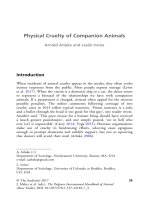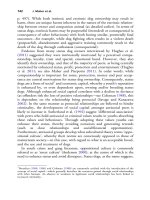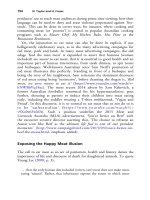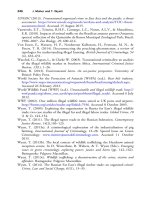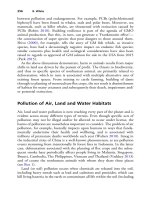The palgrave international handbook of a 260
Bạn đang xem bản rút gọn của tài liệu. Xem và tải ngay bản đầy đủ của tài liệu tại đây (26.35 KB, 1 trang )
256
R. White
between pollution and endangerment. For example, PCBs (polychlorinated
biphenyl) have been found in whales, seals and polar bears. Moreover, sea
mammals, such as killer whales, are threatened with extinction caused by
PCBs (Robin 2010). Building resilience is part of the agenda of GMO
animal production. But this, in turn, can generate a ‘Frankenstein effect’—
the construction of super species that pose dangers to those around them.
Shiva (2000), for example, tells the story of GM fish which, as invasive
species, have had a devastatingly negative impact on endemic fish species;
similar concerns plus health and ecological considerations have also been
raised in regards to approval of GM salmon for sale in the USA from 2015
(Park 2015).
As the above discussions demonstrate, harm to animals results from major
shifts in land use driven by the pursuit of profit. The threats to biodiversity,
and thus to specific species of nonhuman animal, are primarily related to
deforestation, which in turn is associated with multiple alternative uses of
existing forest spaces. From mining to cattle farming, building of dams
through to planting of monoculture flex crops, the net result is diminishment
of habitat for many creatures and subsequently their death, impairment and/
or potential extinction.
Pollution of Air, Land and Water Habitats
Air, land and water pollution is now reaching every part of the planet and is
evident across many different types of terrain. Even though specific acts of
pollution may not be illegal and/or be allowed to occur under license, the
harms of pollution are nonetheless important to consider. The problem of air
pollution, for example, basically impacts upon humans in ways that fundamentally undermine their health and wellbeing, and is associated with
millions of premature deaths worldwide each year (Walters 2010). Smog in
the industrial cities of China is a well-known phenomenon, as are pollution
events stemming from intentionally lit forest fires in Indonesia. In the latter
case, deforestation associated with the planting of flex crops and the subsequent smoke haze periodically affects people living in Malaysia, Singapore,
Brunei, Cambodia, The Philippines, Vietnam and Thailand (Varkkey 2013)
and of course the nonhuman animals with whom they share these places
(see Box 1).
Land (or soil) pollution occurs when chemicals are released into the soil,
including heavy metals such as lead and cadmium and pesticides, which can
kill living bacteria in the earth or contaminate all life within the soil (including
